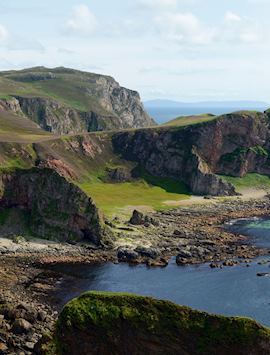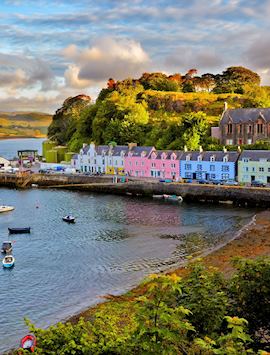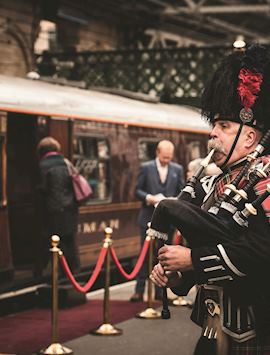When you think about places to visit in Scotland, it’s tempting just to focus in on Edinburgh’s medieval Old Town or the rolling dells and glens of the Highlands. And those two places are at the top of our list, but the country offers much more.
Along the coast, Islay is the Queen of the Hebrides, where you can explore the country’s most renowned whisky distilleries as well as spot some of the abundant wildlife that thrives here. And, further to the north, you can follow a guide to hike among the mossy glens and diminutive waterfalls of Skye.
In St Andrews, you might tee off on one of the classic courses in the spiritual home of golf, while Loch Ness invites watery exploration on a private boat, hearing stories of the lake’s mythic resident. Speyside is best known for its whisky, but we’ll also introduce you to a centuries old fabric mill that produces traditional fine cashmere.
We’ll help you explore the highlights in a new way — for example, you might take a private after-hours tour of Dunvegan Castle with its caretaker — and we’ll show you sides of the country you might not have considered, like a visit with a sheepdog on one of the country’s working farms.
Choose your destination
1. Edinburgh
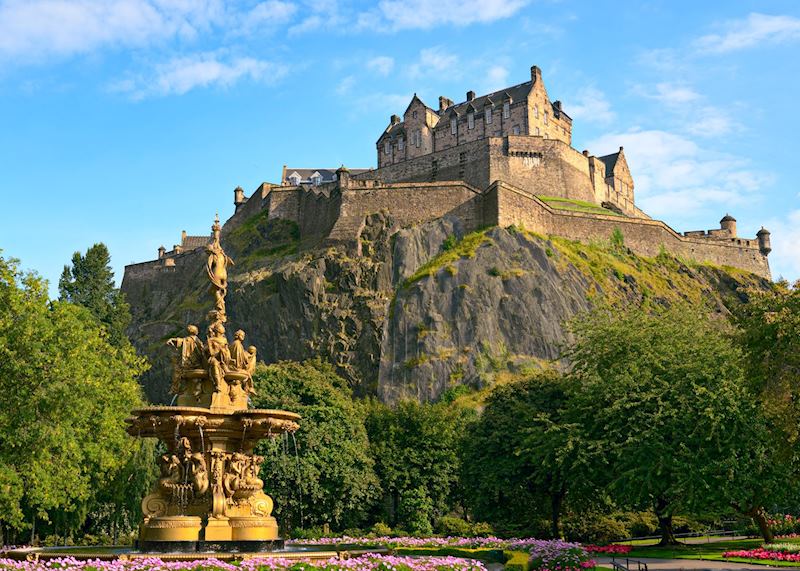
Why visit: medieval architecture, Gothic castles & exceptional food
From the Iron Age fort atop Arthur’s Seat to the cutting-edge art of the Fringe, the entire history of Scotland is written in the streets of Edinburgh, if you know how to read it. Start with a walking tour through the Old and New Towns — you’ll follow your guide down the narrow medieval alleys and along the Royal Mile that stretches between Edinburgh Castle and Holyrood Palace. Then, stroll along the stately streets to admire the 18th-century mansion of New Town.
Additionally, you might explore the many castles, palaces, and grand manors that dot the city and its surrounds — from the flinty silhouette of Blackness Castle, a filming location for Outlander, to the sumptuous interiors of Hopetoun House.
Dig deeper: The city is also an unexpected gastronomic powerhouse, combining both traditional and innovative cuisines. A guided tour of the city’s many eateries will let you sample aged whisky, crumbly cheeses, and classic haggis, among other Caledonian delights.
Don’t miss: Visit a professional storyteller who can regale you with tales — both true and mythic — that illuminate Scottish history. You’ll have the chance to sip several regional whiskies as you listen.
Get me there: Capitals and countryside of England and Scotland
2. Inverness

Why visit: Culloden Battlefields, prehistoric graves & cruising Loch Ness
The largest and most important city in the Highlands, Inverness straddles the River Ness and makes a convenient base for exploring much of the region. You might head up the river to Loch Ness, where you take a leisurely cruise across its inky dark waters, listening to two raconteurs spin tales of the creature said to lurk in its depths.
Beyond the mythic monster, real-life history is also thick on the grounds near Inverness, and it’s a great base for exploring both Culloden Battlefield and the Clava Cairns. On a visit to Culloden, you can see where the Jacobite Rebellion died its final death at the hands of the government Red Coats. For a look into the earliest days of Scottish habitation, you might visit the Bronze-Age Clava Cairns — standing stones and tombs that date back more than 4,000 years. A guided visit will help you understand the extraordinary feat of creating these structures, which align with the winter solstice.
Dig deeper: Of course, the Highlands are known for their whisky, and you can also visit the renowned Glenmorangie Distillery. You might explore the role that oak has in whisky’s aging process, or even sample drams from their exclusive single cask distillations.
Don’t miss: Hard-working sheepdogs are a vital part of caring for the sheep that make Scottish wool possible. Visiting a farm will give you the chance to meet several working dogs and watch them put a herd through its paces.
Get me there: Deluxe castles of Scotland and Ireland
3. Isle of Skye
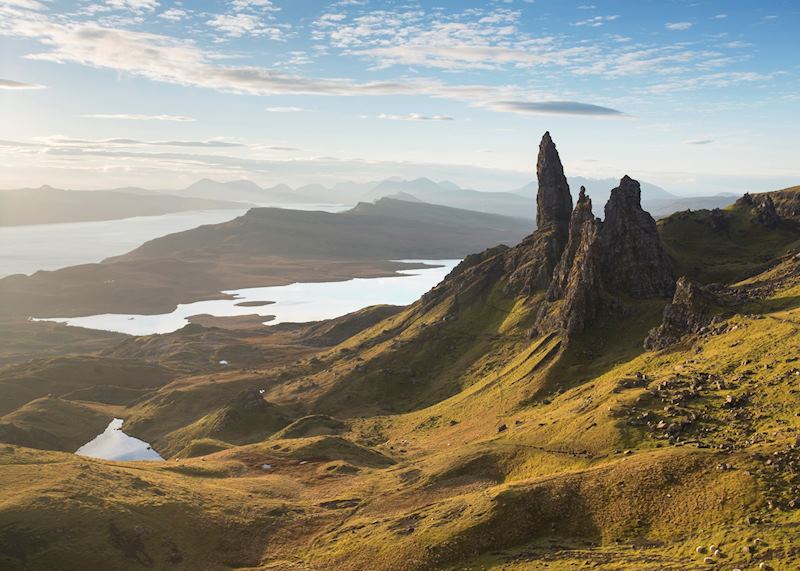
Why visit: hiking amid mossy green dells, salmon fishing & Dunvegan Castle
Seduced by the mossy glens and crystalline waterfalls, many visitors use the word “fairytale” to describe the rugged landscapes of Skye. You can spend days simply hiking among the dark lochs, gnarled rock formations, and white-sand beaches, either on your own or with a local guide.
The island has long been a prime destination for fly fishing, especially the River Snizort, a rapidly flowing river where you can find Atlantic salmon year-round, alongside wild brown trout. If you’d like to try your hand, we can arrange for a session with a local fishing guide, known as a ghillie. They’ll offer lessons for beginners and take you to the hidden pools and fishing holes that only they know.
Dig deeper: A guided hike can help you better understand the natural history of the landscape you’re walking through. We can arrange for a local expert to lead you on a leisurely four-hour route that includes time to explore the small town of Portree.
Don’t miss: Consider an after-hours visit to Dunvegan Castle. You’ll arrive by water and explore the grounds and then, just as everyone else is leaving, head in for a private tour with the castle’s caretaker to hear stories from the McLeod family’s long history.
Get me there: Scenic Scotland
4. The Highlands
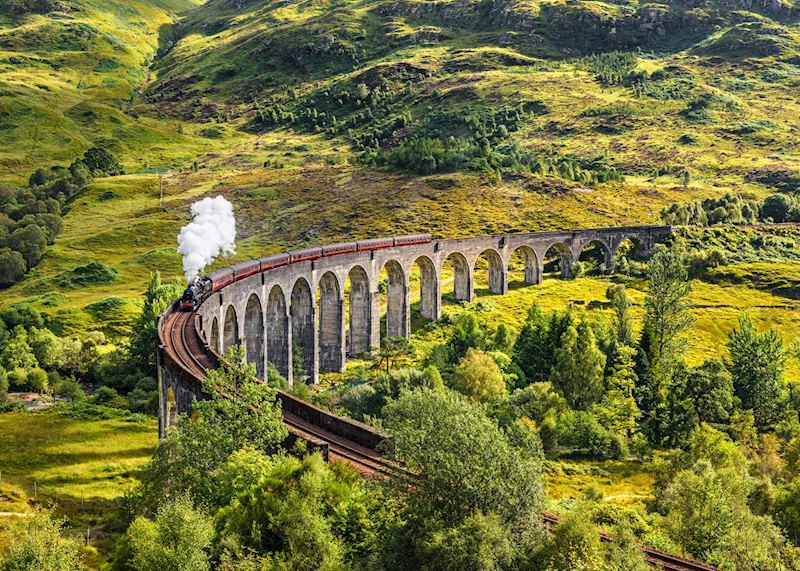
Why visit: sweeping glens, snowy mountains & clan history
Few places to visit in Scotland combine as much natural beauty and clan history as the Highlands. However, this is a remote and rugged region, with only a few roads — we can help you explore its largely inaccessible moorlands, coasts, and islands. You can drive on your own with our directions and suggestions, or we can introduce you to one of the local driver-guides who will take care of the navigation while filling you in on all the complicated stories and legends around you.
To enjoy the natural beauty, might take a walk to Steall Falls — a relatively gentle route that rewards you with views of the towering mountains which surround the Glen Nevis valley. Along the way, you and your guide will stroll through woodlands of birch, Scots pine, oak, and willow.
Dig deeper: For a deep dive into Highland history, you can take a guided tour that includes the prehistoric graves of Clava Cairns, the grand edifice of Cawdor Castle, and Culloden Battlefield, site of the Jacobin’s final, tragic stand.
Don’t miss: For a more leisurely look at the landscape, board The Jacobite Steam Train and soak up the views as you chug along in a cloud of wispy steam.
Get me there: Scenic Scotland
5. Loch Ness

Why visit: a romantic Urquhart Castle, a lake cruise & the mythic monster
Though it’s best known for its (probably) fictional resident, Loch Ness is also surrounded by traditional towns and villages, as well as some of the Highlands’ finest scenery. One of the best ways to explore is from the loch itself.
A private lake cruise on a luxury boat gives you the chance to admire the rolling hills and hear stories spun by the captain, an entertaining local man full of anecdotes and legends about the lake. Additionally, the boat’s larder is fully stocked with single-malt whisky and nibbles. Or, if you like, you can have an afternoon tea.
If you prefer to explore in quieter fashion, take a kayak or canoe out onto the lake, either with a guide or under your own steam. Alternatively, you might pedal along the lakeside or hike the many trails to take in the unspoiled natural beauty of the landscapes.
Dig deeper: If it’s the legendary monster in the depths that interests you, we suggest the Loch Ness Centre. The exhibits examine Nessie and are set in the same house where Mrs Aldie MacKay stayed when she first spotted the elusive creature.
Don’t miss: You might explore the atmospheric remains of Urquhart Castle. Once one of the most important strongholds in the country, it lies in ruin after being blown up by redcoat troops after the defeat of the Jacobites.
Get me there: Scottish family adventure
6. The Cairngorms
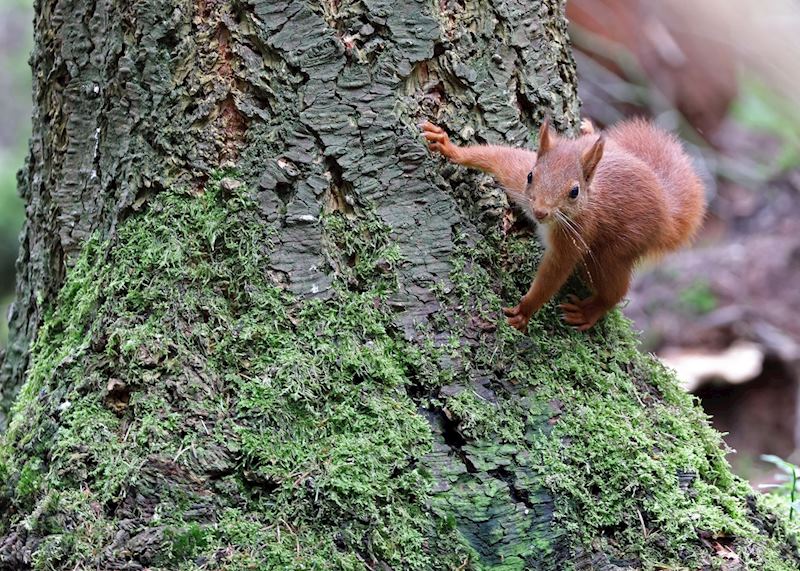
Why visit: hiking a mountain plateau, wildlife & Speyside whisky
One of Europe’s largest remaining wildernesses, a visit to the Cairngorms National Park offers a chance to explore the romantic beauty of the area’s woodlands, castles, and rivers teeming with silvery salmon. On a guided hike here, you might glimpse some of the region’s elusive wildlife, including the Scottish wildcat, golden eagles, and red squirrels.
If you prefer something more active, you could take a mountain bike down the steep trails or climb up some of the steeper slopes.
Within the park is Rothiemurchus, a private estate that protects Scotland's largest remnants of the Caledonian Forest, an ancient pine woodland that once covered the area. You can explore with a ranger from the comfort of a Land Rover. Or, you might visit with a professional photographer who can help you shoot the best wildlife photos possible.
Dig deeper: The Cairngorm region is also home to the Speyside Malt Whisky Trail. A visit to the Dalwhinnie Distillery combines both the history of whisky and a chance to sample some of the best single malt in the region.
Don’t miss: The Scottish residence of the British Royal Family since 1852, Balmoral Castle is a sprawling estate where you can explore the grounds and gardens or see the exhibitions on display inside the grand ballroom.
Get me there: Scottish family adventure
7. Glasgow
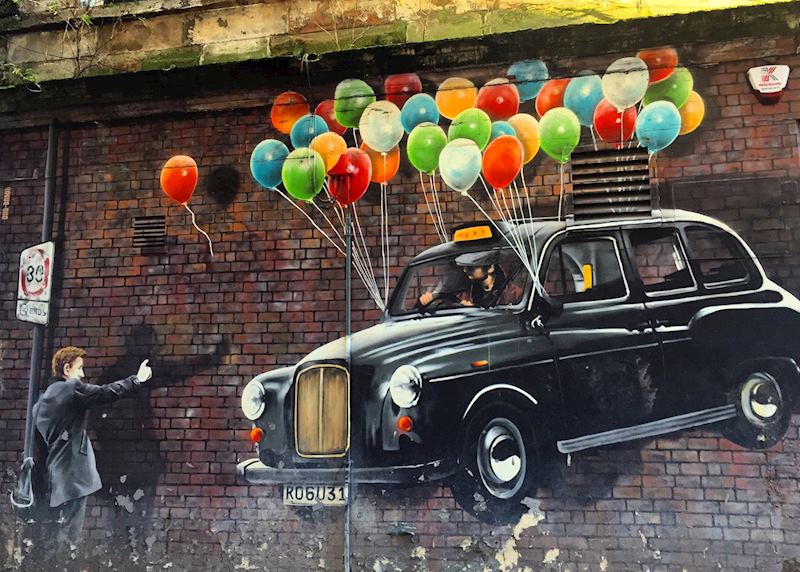
Why visit: street art, live music & a Gothic cathedral
The chic artistic foil to the capital's historic romanticism, Glasgow is a thriving second city with a lively arts culture, including some of the country’s best restaurants and live music venues. A guided tour of the city’s musical heritage will both unlock its traditional past and give you a chance to explore one of Glasgow’s prettiest and oldest areas.
Some musical experiences are more traditional than others of course, and if you want to really understand Scotland’s signature instrument, we suggest a private bagpipe class at the National Piping Centre.
This is also the best place to visit in Scotland to explore street art, which graces the walls here in an ever-changing gallery. Following your local guide, you’ll slip under bridges and stroll down alleys, uncovering some of the city’s most arresting pieces of art.
Dig deeper: Tennent’s beer brewery has been a household name since 1885 and the brewhouse is the site of several interesting pieces of street art, which you can see while learning about the brewing process, followed by a tasting of their regionally renowned lagers.
Don’t miss: The Romans never conquered Scotland, and just south of Glasgow, you can see the furthest northern outposts of their empire: Hadrian's Wall and Vindolanda Fort, an extensive archaeological excavation.
Get me there: Wild Scotland and Ireland
8. Loch Lomond
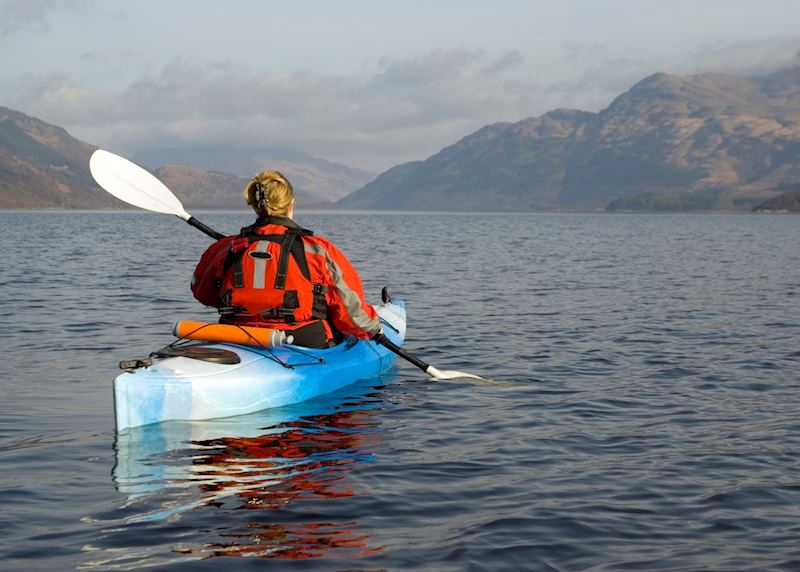
Why visit: kayaking, mountains & William Wallace
The biggest lake in Scotland, Loch Lomond touts itself as the Gateway to the Highlands, and it does indeed make a great base for exploring the region as well as the lake itself. To get your bearings, you might take a seaplane tour over the lake, getting a birds-eye view of the loch, as well as Trossachs National Park, Kyles of Bute, and Loch Fyne.
If you prefer your view to be from the water instead, slip into a kayak and follow a guide across the loch. Paddling is nearly silent, so you won’t disturb the lake’s abundant wildlife and might glimpse some of the beavers, deer, and raptors who make their homes here. You’ll also be able to visit the tiny islands that dot the lake’s surface.
For a more exhilarating experience, you might take a speedboat tour of the lake. You’ll see Rob Roy’s cave and prison and hear stories of some of the islands as you pass them, including the tiny and intriguingly named Island I Vow, an ancient stronghold of the MacFarlane clan.
Dig deeper: Golfers might prefer to soak up the views from the tenth hole of The Carrick Golf Course — sometimes considered the most scenic hole in the whole country.
Don’t miss: To the east of the lake, Stirling is home to the striking Stirling Castle, perched high on a rocky outcrop, as well as the Victorian landmark, the Wallace Monument, a tribute to William Wallace.
Get me there: Family Scottish adventure
9. Oban

Why visit: whisky, exceptional food & ocean views
The port city of Oban is an ideal base for exploring both the Hebrides and Argyll. From here, you might take a driving tour of the mainland’s glens and castles. You’ll meet a fully kilted guide who will take you past the region’s highlights, from the ruined remains of Kilchurn Castle to the stately Inveraray Castle, where the Chief of the Clan Campbell still lives.
You can also catch a cruise to see the colonies of puffins that thrive on nearby Iona and Staff, two of the tiny islands in the Hebrides archipelago.
The city itself also has plenty to offer. It’s home to some of the best, freshest seafood in the country, served everywhere from white-linen restaurants to the Oban Seafood Hut, a literal shack on the quay with a passionate local following.
Dig deeper: The region is also known for its whisky, and you can take a behind-the-scenes tour of the eponymously named distillery. With just two still pots, this is one of the smallest distilleries in the whole country.
Don’t miss: The area around Oban is littered with Neolithic and Bronze Age remains, which you can explore with an expert guide. You’ll learn about the history of the area, the customs and traditions of the early people who lived here, and the significance of the markings on stones across the region.
Get me there: Scottish adventure
10. Islay & Jura
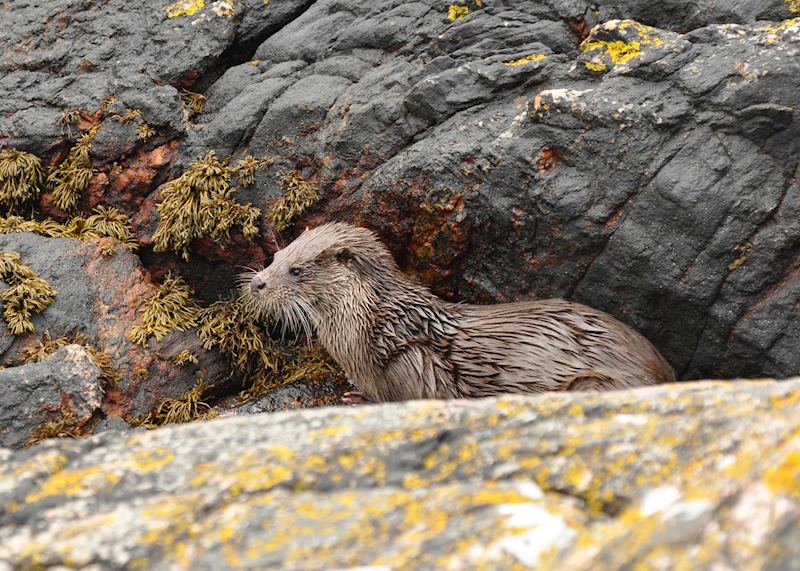
Why visit: whisky & wildlife
Among aficionados, the tiny Isle of Islay is a byword for smoky single malts with an abundance (some might say excess) of character. It's one of the places to visit in Scotland where you can explore many distilleries — including Laphroaig, Lagavulin, and Ardbeg — on your own or we can arrange more in-depth tours.
The island is also part of a thriving marine ecosystem, which you might see from shore or with a guide from a boat. Depending on the season and your luck, you could glimpse otters, seals, wild goats, dolphins, porpoises, and basking sharks. Additionally, more than 100 species of birds live here year-round, with more flapping in during different seasons. You might see puffins, gannets, guillemots, pied wagtails, and hen harriers.
Dig deeper: For some whisky drinkers, a simple tour and tasting isn’t enough. We can arrange more in-depth explorations, from a visit with the woodworkers and coopers who create the casks to a chance to cut your own peat.
Don’t miss: Nearby Jura is even smaller but is worth a visit. A guided tour with a local expert lets you learn more about the island’s crofts, and how original inhabitants managed to live on this remote and wind-buffeted island.
Get me there: Scotland tours
11. St Andrews

Why visit: golf & history in a seaside setting
St Andrews is a wonderful place to visit in Scotland if you want to explore the country’s history. A guided walking tour will help you unpack the city’s importance to the country, from the namesake cathedral — said to hold the bones of the nation’s patron saint — to the university, the oldest and most prestigious in Scotland.
Because it’s still a lively university town, you’ll hear about the students’ age-old traditions, from traditional red robes to jumping over a specific cobblestone to plunging into the icy sea at dawn on the first of May. The tour also includes a visit to St Andrews castle, an atmospheric ruin that stands overlooking the sea. A visit here lets you see the well-preserved tunnels from the siege that took place during the Reformation, offering insight into medieval siege warfare.
Dig deeper: Among golfers, St Andrews is best known as the home of the sport, and there are plenty of links with classic landscaping. We can reserve tee times for you on several of the local courses.
Don’t miss: St Andrews is also where you find Scone Palace, where Scottish kings have been crowned for time out of mind. The original palace was rebuilt in the 19th century, and today you can take a guided tour through the sumptuous rooms, packed with royal portraits and period French furniture.
Get me there: Royal Britain
12. Speyside
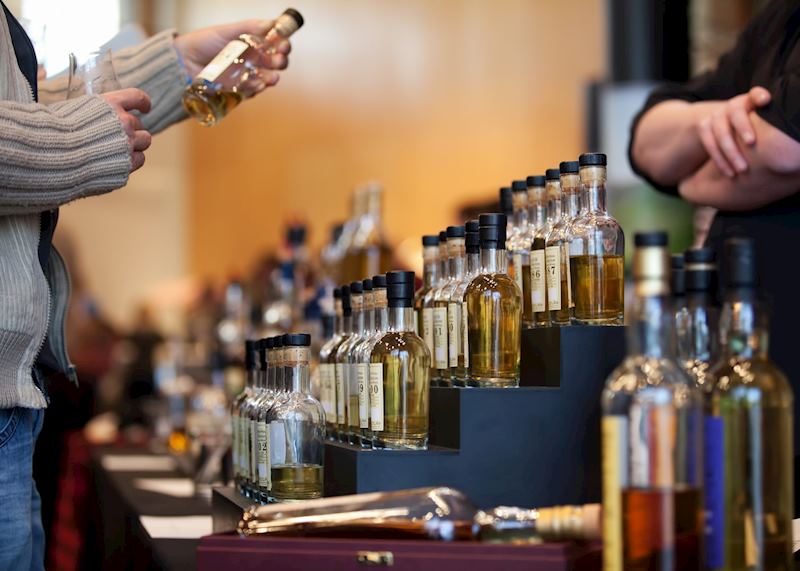
Why visit: whisky, whisky, whisky (& wool)
This tiny region is one of the places in Scotland that is most associated with single-malt whisky — almost half of the country’s distilleries are in Speyside. Enthusiasts can spend several days exploring the nuances of local production.
Of course, you can tour any number of distilleries, from big names like Glenlivet to tiny family-owned operations. Classic tours take you behind the scenes and give you a taste of the complicated process, from mash and malt to barrel aging and finally bottling. You’ll also learn about the region’s complicated history around the drink, and how the area’s climate and water contribute to its taste.
Dig deeper: Dive into the region’s other industry — wool production — with a visit to a 225-year-old woollen mill that produces luxury cashmere. Slip behind the scenes to see the whole process, from raw fiber to a fine finished fabric.
Don’t miss: You might enjoy a “deconstructed” whisky tasting, sipping the raw liquor before it matures in oak casks, followed by a sip of the mature drink, so you can better understand the effects of the long soak in oak wood.
Get me there: Grand tour of the British Isles
Read more about trips to Scotland
Start thinking about your experience. These itineraries are simply suggestions for how you could enjoy some of the same experiences as our specialists. They're just for inspiration, because your trip will be created around your particular tastes.
View All Tours in Scotland
